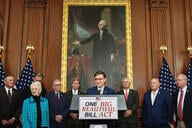You have /5 articles left.
Sign up for a free account or log in.
Jamienne S. Studley, who with Under Secretary Ted Mitchell engineered the Obama administration's surprisingly ambitious second-term higher education agenda, will leave her job this month, the department said Tuesday.
Studley said she was resigning because she had grown weary of living bicoastally and will return to the Bay Area, where her husband has remained during her two and a half years at the Education Department. Her decision comes six weeks after Education Secretary Arne Duncan said he would resign, and can be seen as part of a typical exodus in the final stretch of a presidential second term.
Mitchell praised Studley's work at the department as "extraordinary." "Jamie brought to all of her work a profound understanding of how the department could positively affect the lives of students," the under secretary said in an email to his colleagues Tuesday. "On all projects big or small, Jamie always kept students at the heart of all of her decision making. She pushed me and the team to think about the practical implications of our policies on students, and our work has been much better for the prodding."
Studley joined the Obama administration as an adviser to Under Secretary of Education Martha J. Kanter early in the president's second term, became a deputy under secretary in September 2013 and filled in as under secretary from when Kanter resigned until the Senate confirmed Mitchell to replace her in May 2014. President Obama was the third Democratic president Studley served, having been a special assistant on food and health issues under President Carter and a lead lawyer in the Education Department under President Clinton. In the years between her last two government stints, she was president of Skidmore College, in New York, and president of Public Advocates, a consumer law and advocacy group. (Note: This paragraph has been updated from an earlier version to correct what Studley did in the Carter administration.)
Her two and a half years in the current go-round at the department have been characterized by a remarkable amount of activity. Much of that work has been of the agency's own choosing, including the ratcheting up of regulatory oversight of for-profit colleges and campus responses to sexual assault, as well as an ill-fated effort to rate colleges' performance. Some of it, however, was driven significantly by external circumstances, such as the collapse of the giant for-profit Corinthian Colleges chain.
On many of those issues, Studley's work frequently put her at odds with college officials, most notably on the proposed ratings system, which many people in higher education disliked from the start. Studley and Mitchell engaged in an intense road show around the ratings system, explaining tirelessly (if not always persuasively) why President Obama was so enamored of the concept and how it might work in actuality. (Ultimately they decided it couldn't work, at least not with the data available now, so the administration opted for a much more limited approach in the College Scorecard.)
But even amid the contention, Studley won high marks from college lobbyists for her tendency to seek advice and to listen.
"Obviously we didn't always agree with her, especially on regulatory issues," said Terry W. Hartle, senior vice president for government and public affairs at the American Council on Education. "But she was always willing to listen and engage with us. She was anxious to get advice, and you don't always get that from political appointees."
Mitchell said the department had not yet identified someone to succeed Studley as deputy under secretary. He did say her other current role -- as acting assistant secretary for postsecondary education since the departure of Ericka M. Miller for the College Board -- would be filled in the short term by Lynn Mahaffie, deputy assistant secretary for policy, planning and innovation.
Much remains on the department's to-do list for the final year of the Obama presidency. A lot of it is carrying out existing initiatives -- refining the College Scorecard, implementing the gainful employment rules and teacher education regulations, turning up the pressure on accrediting agencies, and developing policies for when borrowers should have their student debt waived because of malfeasance by colleges.
The biggest unknown for department officials, and a potential successor to Studley, is whether legislation to renew the Higher Education Act will move through Congress in the relatively minimal time that lawmakers will actually have to legislate during an election year. It is hard to picture Congress rewriting an 1,100-page law before Labor Day, but the heads of both congressional education committees are insisting that is their goal.





